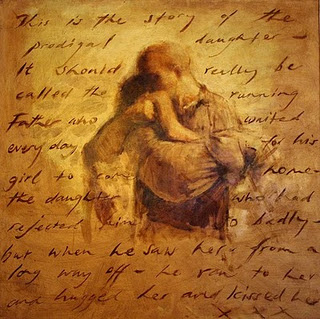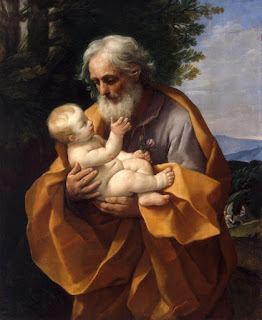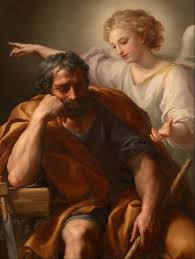
Today's feast is the Feast of St Joseph (the Worker). One of the lessons we take from Joseph's story is the importance of faithfulness to our daily work, to our commitments no matter how small or apparently insignificant because such faithfulness can allow momentous things to happen and it is through such faithfulness in small, everyday things, that the will of the infinite God to set all things to rights (that is, the will to do justice) is ultimately done. We don't know lots of stories about Joseph but we do know that he struggled to discern and do the will of God, that he committed himself to what God was doing through Mary, and that he supported and expressed this by his daily faithfulness and work, both as an artisan and as husband and Father.
Especially poignant is the Matthean story of Joseph as the icon of one who struggles to allow God's own justice to be brought to birth as fully as possible. It is, in its own way, a companion story to Luke's account of Mary's annunciation and fiat. Both Mary (we are told explicitly) and Joseph (we are told implicitly) ponder things in their hearts, both are mystified and shaken by the great mystery which has taken hold of them and in which they have become pivotal characters. Both allow God's own power and presence to overshadow them so that God might do something absolutely new in their world. But it is Joseph's more extended, profound, and profoundly faithful struggle to truly do justice in mercy, and to be a righteous man who reveals God's own justice in love, God's salvation, that is at the heart of those few stories we have about Joseph. In light of this I want to reprise what we hear about Joseph during Advent.
The Struggle to Do Justice, the Situation (Reprise):
I am a little ashamed to say I have never spent much time considering Joseph's predicament or the context of that predicament until this week. Instead I have always thought of him as a good man who chose the merciful legal solution rather than opting for the stricter one. I never saw him making any other choice nor did I understand the various ways he was pushed and pulled by his own faith and love. But Joseph's situation was far more demanding and frustrating than I had ever appreciated! Consider the background which weighed heavy on Joseph's heart. First, he is identified as a just or righteous man, a man faithful to God, to the Covenant, a keeper of the Law or Torah, an observant Jew who was well aware of Jeremiah's promise and the sometimes bitter history of his own Davidic line. All of this and more is implied here by the term "righteous man". In any case, this represents his most foundational and essential identity. Secondly, he was betrothed to Mary, wed (not just engaged!) to her though he had not yet taken her to his family home and would not for about a year. That marriage was a symbol of the covenant between God and his People Israel. Together he and Mary symbolized the Covenant; to betray or dishonor this relationship was to betray and profane the Covenant itself. This too was uppermost in Joseph's mind precisely because he was a righteous man.
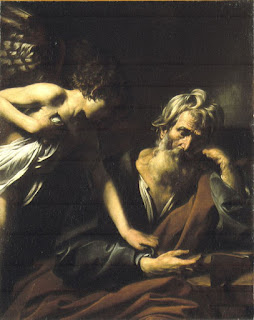 Thirdly, he loved Mary and was entirely mystified by her pregnancy. Nothing in his tradition prepared him for a virgin birth. Mary could only have gotten pregnant through intercourse with another man so far as Joseph could have known --- and this despite Mary's protestations of innocence. (The OT passage referring to a virgin is more originally translated as "young woman". Only later as "almah" was translated into the Greek "parthenos" and even later was seen by Christians in light of Mary and Jesus' nativity did "young woman" firmly become "a virgin".) The history of Israel was fraught with all-too-human failures which betrayed the covenant and profaned Israel's high calling. While Joseph was open to God doing something new in history it is more than a little likely that he was torn between which of these possibilities was actually occurring here, just as he was torn between believing Mary and continuing the marriage and divorcing her and casting her and the child aside.
Thirdly, he loved Mary and was entirely mystified by her pregnancy. Nothing in his tradition prepared him for a virgin birth. Mary could only have gotten pregnant through intercourse with another man so far as Joseph could have known --- and this despite Mary's protestations of innocence. (The OT passage referring to a virgin is more originally translated as "young woman". Only later as "almah" was translated into the Greek "parthenos" and even later was seen by Christians in light of Mary and Jesus' nativity did "young woman" firmly become "a virgin".) The history of Israel was fraught with all-too-human failures which betrayed the covenant and profaned Israel's high calling. While Joseph was open to God doing something new in history it is more than a little likely that he was torn between which of these possibilities was actually occurring here, just as he was torn between believing Mary and continuing the marriage and divorcing her and casting her and the child aside.
What Were Joseph's Options?
Under the Law Joseph had two options. The first involved a very public divorce. Joseph would bring the situation to the attention of the authorities, involve witnesses, repudiate the marriage and patrimony for the child and cast Mary aside. This would establish Joseph as a wronged man and allow him to continue to be seen as righteous or just. But Mary could have been stoned and the baby would also have died as a result. The second option was more private but also meant bringing his case to the authorities. In this solution Joseph would again have repudiated the marriage and patrimony but the whole matter would not have become public and Mary's life or that of the child would not have been put in immediate jeopardy. Still, in either instance Mary's shame and apparent transgressions would have become known and in either case the result would have been ostracization and eventual death. Under the law Joseph would have been called a righteous man but how would he have felt about himself in his heart of hearts? Would he have wondered if he was just under the Law but at the same time had refused to hear the message of an angel of God, refused to allow God to do something new and even greater than the Law?
Of course, Joseph might have simply done nothing at all and continued with the plans for the marriage's future. But in such a case many problems would have arisen. According to the Law he would have been falsely claiming paternity of the child --- a transgression of the Law and thus, the covenant. Had the real father shown up in the future and claimed paternity Joseph would then have been guilty of "conniving with Mary's own sin" (as Harold Buetow describes the matter). Again Law and covenant would have been transgressed and profaned. In his heart of hearts he might have believed this was the just thing to do but in terms of his People and their Covenant and Law he would have acted unjustly and offended the all-just God. Had he brought Mary to his family home he would have rendered them and their abode unclean as well. If Mary was guilty of adultery she would have been unclean --- hence the need for ostracizing her or even killing her!
Entering the Liminal Place Where God May Speak to Us:

All of this and so much more was roiling around in Joseph's heart and mind! In one of the most difficult situations we might imagine, Joseph struggled to discern what was just and what it would mean for him to do justice in our world! Every option was torturous; each was inadequate for a genuinely righteous man. Eventually he came to a conclusion which may have seemed the least problematical even if it was not wholly satisfactory, namely to put Mary away "quietly", to divorce her in a more private way and walk away from her. And at this moment, when Joseph's struggle to discern and do justice has reached it's most neuralgic point, at a place of terrible liminality symbolized in so much Scriptural literature by dreaming, God reveals to Joseph the same truth Mary has herself accepted: God is doing something unimaginably new here. He is giving the greatest gift yet. The Holy Spirit has overshadowed Mary and resulted in the conception of One who will be the very embodiment of God's justice in our world. Not only has a young woman come to be pregnant but a virgin will bear a child! The Law will be fulfilled in Him and true justice will have a human face as God comes to be Emmanuel in this new and definitive way.
Joseph's faith response to God's revelation has several parts or dimensions. He decides to consummate the marriage with Mary by bringing her to his family home
but not as an act of doing nothing at all and certainly not as some kind of sentimental or cowardly evasion of real justice. Instead it is a way of embracing the whole truth and truly doing justice. He affirms the marriage and adopts the child as his own. He establishes him in the line of David even as he proclaims the child's true paternity. He does this by announcing this new Son's name to be Jesus, God saves. Thus Joseph proclaims to the world that God has acted in this Son's birth in a new and way
which transcends and relativizes the Law even as it completely respects it. He honors the Covenant with a faithfulness that leads to that covenant's perfection in the Christ Event. In all of this Joseph continues to show himself to be a just or righteous man, a man whose humanity and honor we ourselves should regard profoundly.
Justice is the way to Genuine Future:
Besides being moved by Joseph's genuine righteousness, I am struck by a couple of things in light of all of this. First, discerning and doing justice is not easy. There are all kinds of solutions which are partial and somewhat satisfactory, but real justice takes work and, in the end, must be inspired by the love and wisdom of God. Secondly, Law per se can never really mediate justice. Instead, the doing of justice takes a human being who honors the Law, feels compassion, knows mercy, struggles in fear and trepidation with discerning what is right, and ultimately is open to allowing God to do something new and creative in the situation. Justice is never a system of laws, though it will include these. It is always a personal act of courage and even of worship, the act of one who struggles to mediate God's own plan and will for all those and that involved. Finally, I am struck by the fact that justice opens reality to a true future. Injustice closes off the future. In all of the partial and unsatisfactory solutions Joseph entertained and wrestled with, each brought some justice and some injustice. Future of some sort was assured for some and foreclosed to others; often both came together in what was merely a sad and tragic approximation of a "real future". Only God's own will and plan assures a genuine future for the whole of his creation. That too is something yesterday's Gospel witnessed to.
Another Look at Joseph:
Joseph is a real star in Matt's account of protecting Jesus' nativity; he points to God and the justice only God can do. It is important, I think, to see all that he represents as Mary's counterpart in the nativity of Jesus (Son of David) who is Emmanuel (Son of the One who, especially in Jesus, is God With Us). Mary's fiat seems easy, graceful in more than one sense of that term. Joseph's fiat is hard-won but also graced or graceful. For Joseph, as for Mary, there is real labor involved as the categories of divinity and justice, law and covenant are burst asunder to bring the life and future of heaven to birth in our world. But Joseph with Mary also both lived essentially hidden lives which were faith in all the little and big moments of being spouses and parents --- the vocations which allowed God's will to justice too be accomplished in their Son, Jesus.
May we each be committed to mediating God's own justice and bringing God's future into being especially in this Easter season. This is the time when we especially look ahead to the coming of the Kingdom of God and to the time when God will be all in all. May we never take refuge in partial and inadequate solutions to our world's problems and need for justice, especially out of shortsightedness, sentimentality, cowardice, evasion, or fear for our own reputations. And may we allow Joseph to be the model of discernment, humility, faithfulness and courage in mediating the powerful presence and future of God we recognize as justice and so yearn for in this 21st Century.

 I personally love Eisenbacher's picture above because it reminds me of one privileged expression of such spiritual friendship, namely that of spiritual direction. I can remember many meetings with my own director where there was immense surprise and joy at the sharing involved, but one time in particular stands out --- especially in light of today's Gospel. I had experienced a shift in my experience of celibacy. Where once it mainly spoke to me of dimensions of my life that would never be fulfilled (motherhood, marriage, etc), through a particular prayer experience it had come to be associated instead with espousal to Christ and my own sense of being completed and fulfilled as a woman. As I recall, when I met with my director to share about this experience, I spoke softly about it, carefully, a little bashfully --- especially at first; but I also gained strength and greater confidence in the sharing of it. (I was not uncertain as to the nature of what I had experienced, but sharing it allowed it to claim me more completely and let me claim a new sense of myself in light of it.) My director listened carefully, and only then noted that she had always prayed for such a grace for all her novices (she had been novice director for her congregation); she then excused herself and left briefly. When she returned she had a CD and CD player with her. Together we sat quietly, but joyfully and even a bit tearfully celebrating what God had done for us while we listened to John Michael Talbot's Canticle of the Bride.
I personally love Eisenbacher's picture above because it reminds me of one privileged expression of such spiritual friendship, namely that of spiritual direction. I can remember many meetings with my own director where there was immense surprise and joy at the sharing involved, but one time in particular stands out --- especially in light of today's Gospel. I had experienced a shift in my experience of celibacy. Where once it mainly spoke to me of dimensions of my life that would never be fulfilled (motherhood, marriage, etc), through a particular prayer experience it had come to be associated instead with espousal to Christ and my own sense of being completed and fulfilled as a woman. As I recall, when I met with my director to share about this experience, I spoke softly about it, carefully, a little bashfully --- especially at first; but I also gained strength and greater confidence in the sharing of it. (I was not uncertain as to the nature of what I had experienced, but sharing it allowed it to claim me more completely and let me claim a new sense of myself in light of it.) My director listened carefully, and only then noted that she had always prayed for such a grace for all her novices (she had been novice director for her congregation); she then excused herself and left briefly. When she returned she had a CD and CD player with her. Together we sat quietly, but joyfully and even a bit tearfully celebrating what God had done for us while we listened to John Michael Talbot's Canticle of the Bride. Elizabeth and Mary come together as women both touched in significant ways by the mystery of God. They have trusted God but are not yet completely clear regarding the greater mystery or how this experience fits into the larger story of Israel's redemption. They are both in need of one another and especially of the perception and wisdom the other can bring to the situation so that they can truly offer God and God's plan all the space and time these require. Hospitality, especially giving God hospitality, takes many forms, but one of the most important involves coming together to share how God is active in our lives in the hope of coming to a greater and more life giving perspective, faith, and commitment. It is in coming together in this way that we clarify, encourage, challenge and console one another. It is in coming together in this way that we become the prophetic presence in our world God calls us to be. The gift of being able to "speak frankly" as sisters (and brothers) is an inestimable gift of God. Let us all be open to serving as friends to one another in this sense. It is an essential dimension of being Church and of the coming of the Kingdom of God.
Elizabeth and Mary come together as women both touched in significant ways by the mystery of God. They have trusted God but are not yet completely clear regarding the greater mystery or how this experience fits into the larger story of Israel's redemption. They are both in need of one another and especially of the perception and wisdom the other can bring to the situation so that they can truly offer God and God's plan all the space and time these require. Hospitality, especially giving God hospitality, takes many forms, but one of the most important involves coming together to share how God is active in our lives in the hope of coming to a greater and more life giving perspective, faith, and commitment. It is in coming together in this way that we clarify, encourage, challenge and console one another. It is in coming together in this way that we become the prophetic presence in our world God calls us to be. The gift of being able to "speak frankly" as sisters (and brothers) is an inestimable gift of God. Let us all be open to serving as friends to one another in this sense. It is an essential dimension of being Church and of the coming of the Kingdom of God.

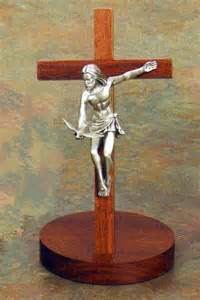
.jpg)






